The sense of progress black Americans felt in 2009, on the heels of Barack Obama’s historic election as president, seems to have reversed itself. Today, only about one-in-four (26%) say the situation of black people in this country is better now than it was five years ago, down sharply from 39% who said this in 2009. Nearly as many (21%) say the situation of black people is worse today, and 51% say it’s about the same.
The positive feelings registered in 2009 among blacks represented one of the peaks in this long-term trend. Even in the face of the Great Recession, blacks seemed buoyed by the promise of an Obama presidency. This poll does not provide evidence as to what caused the downward shift in opinions about black progress. However, the fading glow of Obama’s first term and the lingering effects of the recession are likely to have been important factors.
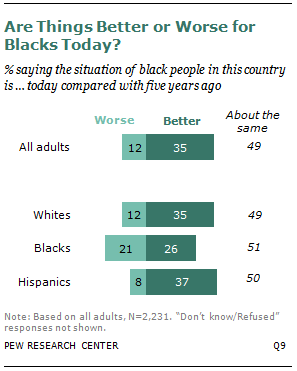 Whites have a somewhat different view of black progress than do blacks themselves. Some 35% of whites say that compared with five years ago, the situation of black people in this country today is better. Only 12% say the situation of African Americans is worse today, and 49% say it’s about the same. Hispanics’ views on the situation of blacks today are similar to those of whites: 37% of Hispanics say blacks are better off today than they were five years ago, 8% say things are worse for African Americans and 50% say things are about the same.
Whites have a somewhat different view of black progress than do blacks themselves. Some 35% of whites say that compared with five years ago, the situation of black people in this country today is better. Only 12% say the situation of African Americans is worse today, and 49% say it’s about the same. Hispanics’ views on the situation of blacks today are similar to those of whites: 37% of Hispanics say blacks are better off today than they were five years ago, 8% say things are worse for African Americans and 50% say things are about the same.
While whites have a more positive view of black progress, the trajectory of opinion for whites and blacks has been similar over time. The gap in opinion remained fairly consistent until 2009, when it narrowed considerably.
The gap in views between whites and blacks was widest in 1984, when the Gallup Organization first asked this question. At that time, 68% of white adults said blacks were in a better situation than they had been five years earlier. Only 4% said the situation of blacks was worse at that time than it had been five years prior. The sense that African Americans were making progress in 1984 may have been connected to Jesse Jackson’s first run for president—a historic occurrence for both blacks and whites. Meanwhile, only 37% of blacks in 1984 thought that black people were in a better situation at that time than they had been five years earlier, and 30% said the situation of blacks was worse than it had been five years earlier.
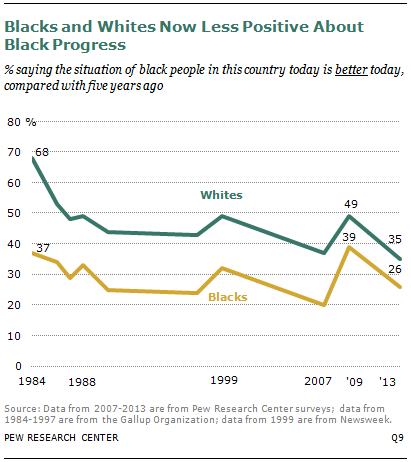 From 1986 to 1999, the assessments of whites and blacks with regard to black progress remained fairly consistent, as did the black-white gap in opinion. A dramatic spike upward occurred between 2007 and 2009, with both whites and blacks expressing much more positive views about African American progress in 2009 than they had two years earlier. At the time, the sharp change in opinion was attributed to Obama’s election as well as improved assessments of race relations.
From 1986 to 1999, the assessments of whites and blacks with regard to black progress remained fairly consistent, as did the black-white gap in opinion. A dramatic spike upward occurred between 2007 and 2009, with both whites and blacks expressing much more positive views about African American progress in 2009 than they had two years earlier. At the time, the sharp change in opinion was attributed to Obama’s election as well as improved assessments of race relations.
In the most recent Pew Research survey, the share of both whites and blacks who see short-term progress for black Americans is down significantly from the 2009 levels. For whites, the current share (35%) saying the situation of African Americans is better than it was five years ago is similar to what it was in 2007 and lower than it had been in the mid-1980s and 1990s. For blacks, the share saying blacks are better off today (26%) has returned to roughly where it was prior to Obama’s election.
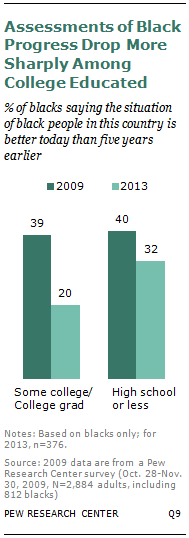 Today opinions about black progress vary considerably by educational attainment among blacks. This was not the case in 2009. In the latest survey, blacks with some college experience have a much more negative assessment of the situation of African Americans today compared with blacks who have no formal education beyond high school. Among blacks who have attended at least some college, only 20% say the situation of African-American people in this country is better today than it was five years ago. Among those with a high school education or less, roughly one-third (32%) say things are better today.
Today opinions about black progress vary considerably by educational attainment among blacks. This was not the case in 2009. In the latest survey, blacks with some college experience have a much more negative assessment of the situation of African Americans today compared with blacks who have no formal education beyond high school. Among blacks who have attended at least some college, only 20% say the situation of African-American people in this country is better today than it was five years ago. Among those with a high school education or less, roughly one-third (32%) say things are better today.
In 2009, there was virtually no gap on this measure between college-educated blacks and those with a high school diploma or less. Roughly four-in-ten from each group said things were better for blacks in 2009 than they had been five years earlier.
Whites’ views of black progress do not differ by education in the 2013 survey, nor did they in 2009. In each year nearly identical shares of college-educated whites and those with a high school education or less said that blacks were better off than they had been five years earlier.
Blacks, Whites and Financial Well-Being
In real terms, blacks lag behind whites in several key economic indicators. The median annual household income for black households of three in 2011 was significantly below that of whites. Blacks were nearly three times as likely as whites to be living in poverty. And the median net worth of white households was 14 times the median net worth of black households.
This reality is not lost on the public. When asked in the new survey whether the average black person is better off, worse off or about as well off as the average white person in terms of income and overall financial situation, only one-in-ten adults say the average African American is better off. Roughly four-in-ten adults (41%) say the average African American is worse off than the average white person, and the same share says the average black person is about as well off.
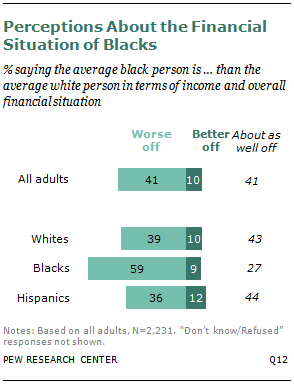 Blacks and whites have different assessments of the economic well-being of blacks today. Black adults are much more likely than whites to say the average black person is worse off financially than the average white person (59% vs. 39%). Whites, meanwhile, are more likely than blacks to say the average black person is about as well off as the average white person (43% vs. 27%).
Blacks and whites have different assessments of the economic well-being of blacks today. Black adults are much more likely than whites to say the average black person is worse off financially than the average white person (59% vs. 39%). Whites, meanwhile, are more likely than blacks to say the average black person is about as well off as the average white person (43% vs. 27%).
The views of Hispanics are similar to those of whites when it comes to the financial situation of blacks today. Some 36% of Hispanic adults say the average black person is worse off financially than the average white person, 12% say better off and 44% say the average black person is about as well off as the average white person.
Educational attainment and income levels are closely related to perceptions about blacks’ financial well-being relative to whites. And this is true among both blacks and whites. Higher-income blacks and whites are more likely than those with lower annual incomes to say that the average black person is worse off financially than the average white person. Similarly, those with higher levels of educational attainment are more likely than their less-educated counterparts to say that blacks are worse off than whites.
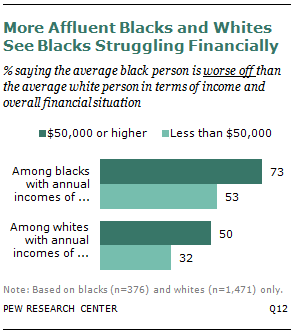 Among African Americans with annual family incomes of $75,000 or more, 79% say the average black person is worse off than the average white person in terms of overall financial situation. Among those with annual incomes less than $75,000, 56% say the same. Lower-income African Americans are more likely than those with higher incomes to say the average black person is about as well off the average white person (31% vs. 16%).
Among African Americans with annual family incomes of $75,000 or more, 79% say the average black person is worse off than the average white person in terms of overall financial situation. Among those with annual incomes less than $75,000, 56% say the same. Lower-income African Americans are more likely than those with higher incomes to say the average black person is about as well off the average white person (31% vs. 16%).
The pattern is similar among whites. About half (52%) of whites with annual family incomes of $75,000 or more say the average black person is worse off financially than the average white person. This compares with only 35% of whites with annual incomes of less than $75,000 who say that. Lower-income whites are more likely than those with higher incomes to say blacks are about as well off as whites when it comes to their financial situation (47% vs. 33%).
Among both blacks and whites, those with higher levels of education are more likely than those with less education to say that the average black person is worse off financially compared with the average white person. Fully 75% of blacks who have attended college say this, compared with 42% of those with a high school education or less. Similarly, 47% of whites with at least some college education say the average black person is worse off than the average white person in terms of their financial situation. Only 26% of whites who have not attended college say the same.


 Interactive Tracking 50 Years of Demographic Trends
Interactive Tracking 50 Years of Demographic Trends